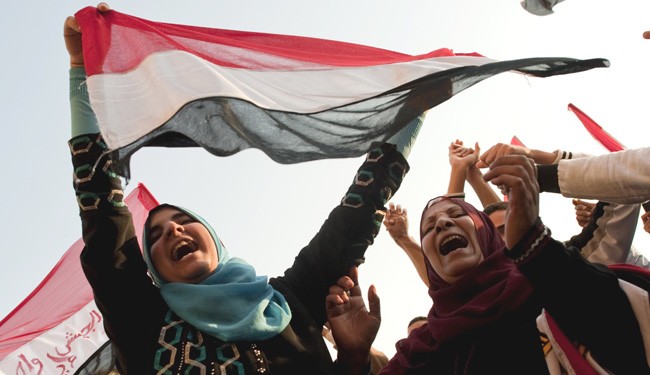- What We Do
- Agriculture and Food Security
- Democracy, Human Rights and Governance
- Economic Growth and Trade
- Education
- Ending Extreme Poverty
- Environment and Global Climate Change
- Gender Equality and Women's Empowerment
- Global Health
- Water and Sanitation
- Working in Crises and Conflict
- U.S. Global Development Lab
Women have the right to participate in political processes that affect them, their families, and their societies. Countries with increased women’s participation and leadership in civil society and political parties tend to be more inclusive, responsive, egalitarian, and democratic. When women meaningfully participate in peace processes, they can help to expand the scope of agreements and improve the prospects for durable peace.
Yet, women around the world are still largely absent from national and local decision-making bodies; struggle to have a voice in peacebuilding transitions; and are excluded from political processes. Despite representing half the global population, women comprise less than 20 percent of the world’s legislators. From discrimination and violence to a lack of support and resources, women face countless challenges to participation in the civic and political life of their countries.
Strengthening women’s rights and addressing barriers to political participation are critical to achieving gender equality and female empowerment.That’s why we’re supporting women around the world by:
- Providing training for female members of political parties and parliaments and supporting the development of women’s caucuses
- Providing skill building and leadership training for women civil society members, women’s organizations, and female journalists
- Supporting women’s participation in political and post-conflict transitions
- Improving women’s access to justice and increasing women’s participation and representation in the justice sector
- Supporting local efforts to advocate for legal rights that enable women to participate fully in the political and economic life of their societies
- Building capacity for civil society organizations to advocate for women’s participation in political transitions and governance processes

To help USAID better achieve these goals, in 2012 the agency launched the Center of Excellence on Democracy, Human Rights, and Governance (DRG Center), a global resource for evidence-based research. Since its launch, the DRG Center has provided technical expertise, urgent funding, and critical information to the U.S. Government and international development community.
- The Women in Power (WiP) Project: A research and learning project that reviewed USAID’s programming related to the promotion of women’s political empowerment and leadership, examined successes and challenges in historical and current programming, and tested a new statistical model for measuring women’s political leadership. The project concluded with the Women’s Leadership and Political Empowerment Progress Review and Ways Forward Workshop in November 2014. In 2015, USAID will implement a follow-on activity to the WiP project that will produce learning products for internal and external distribution and integrate research results into existing trainings. WiP resources include:
- Desktop Study of USAID Programming: The Desktop Study documented objectives, approaches, and results USAID activities , that aimed to increase women's political representation and leadership.
- Country Case Studies: Five case studies, conducted in Cambodia, Georgia, Jordan, Kenya and Mexico, provide a deeper look at the objectives and achievements of select USAID-funded programs with a significant focus on women's leadership and political empowerment.
- Diamond Leadership Model Report: The Report on the Diamond Leadership Model provides information on a new measure of women's leadership and power in the public arena. The model, piloted in 30 countries, measures three levels of leadership (high, mid, and low) across four government sectors (legislative, executive, judicial, and security).
- WiP Video: View the video clip for an overview of the project, including interviews with USAID leadership and segments from the 2014 WiP Workshop.
- Women in Power Summary Report [PDF, 1.2MB]: The report gives an overview of the WIP program and Diamond Leadership Model, key findings, and recommendations for USAID and external partners.
- Global Women’s Leadership Program (GWLP): Supports the participation of women in peace processes, political transitions, donor conferences, and other decision-making processes relevant to conflict prevention and resolution, democratic development, and human rights. The GWLP has supported female delegates to Yemen’s National Dialogue Conference and women involved in peace-building and national reconciliation efforts between the North and South of Yemen. In Burma, GWLP activities were geared toward integrating gender into electoral systems and processes. GWLP programming has worked with female members of parliament (MPs) and civil-society leaders to understand opportunities within the electoral reform agenda in advance of the 2015 elections. In addition to individual consultations, three successful events were held with female MPs and civil society leaders to discuss women’s political leadership and learn from Indonesia’s electoral reform process.
- Global Labor Program (GLP): With a budget of $50 million, the five-year program (2016 - 2021) is being implemented by the Solidarity Center, and promotes labor rights and access to justice for workers. The new award supports country programs in Cambodia, Bangladesh, Burma, Ukraine, Morocco, South Africa, Colombia, Mexico and regional programs in Asia, Eastern Europe, the Middle East, Southern Africa and Latin America that cover activities in 31 countries. The regional program in Latin America has a dedicated Central America component, housed in El Salvador. All program activities are designed to be inclusive of vulnerable populations, including women. Cross-cutting regional and global activities include grassroots trainings for advocacy to address gender-based violence at work.







Comment
Make a general inquiry or suggest an improvement.